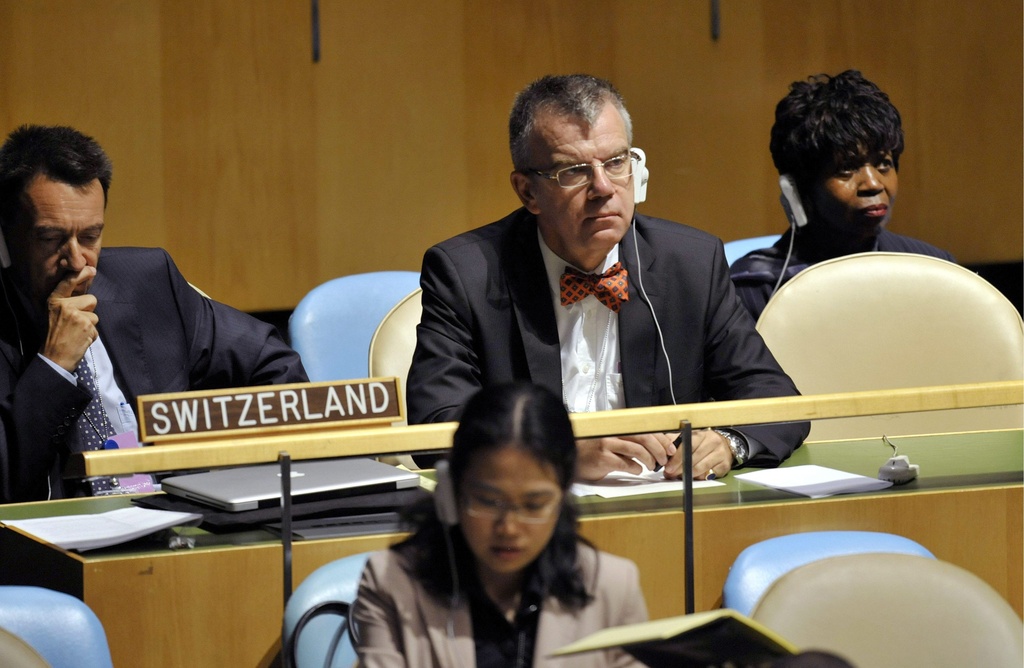
Swiss withdraw UN draft resolution

Switzerland and four other states have withdrawn a draft resolution on reforming the working methods of the United Nations Security Council. The text was intended to make the UN’s most powerful organ more transparent and accountable.
The “Small 5” group (S5) – Switzerland, Costa Rica, Jordan, Liechtenstein and Singapore – submitted the draft resolution in March; it included an annexe with 20 recommendations.
Wednesday’s withdrawal of the text in New York was mostly the result of pressure exerted by the powerful five permanent members of the council: China, France, Russia, Britain and the United States.
Among other things, the draft proposal had recommended that those five permanent members refrain from using their veto power to block action aimed at preventing or ending genocide, war crimes or crimes against humanity.
“In substance nearly everybody was agreeing with our proposals,” said Paul Seger, Switzerland’s ambassador to the UN. However, there were growing concerns of procedural problems raised by member states.
Contested legal opinion
The five permanent members of the Security Council (P5) “told us clearly that they would not see favourably any kind of resolution regarding working methods of the Security Council”, Seger added.
While saying they were willing to continue improving the working methods, they were of the opinion “that this is the sole and exclusive domain of the Security Council”, the Swiss ambassador explained in a meeting with the media after the S-5 had withdrawn its draft.
Added to this came a legal opinion by the UN’s top legal advisor, Patricia O’Brien. She had concluded that the draft resolution was to be considered under the aspect of comprehensive reform of the council and should therefore be submitted to a qualified two-thirds majority of all member states.
Seger, who used to be the Swiss government’s legal advisor does not agree with the conclusion. “I do not share this interpretation and cannot understand it,” he stated.
“Our reform proposals were concrete and pragmatic steps designed to improve the work of the Security Council and its cooperation with the General Assembly. They could be implemented today without the need for any amendment of the UN Charter,” Seger said.
The Swiss ambassador noted that the UN Charter provided that the assembly could make recommendations to the council, and that it was in this spirit that the S5 had submitted its text. The language was respectful of the roles of both bodies and recognised the council as “master of its own procedures”.
However, in order to avoid an “intense and politically complex” procedural battle in the assembly, the sponsor states eventually decided to withdraw their project.
“If common sense is indeed the common denominator of this Assembly, then this resolution would pass with ease,” said Seger as he introduced and withdrew the resolution on behalf of the members of the S5.
More transparency
In the eyes of the S5, the council should include those UN member states that are not part of the council more closely in its deliberations.
The vast majority of member states are not represented on the 15-member council. Nevertheless, all member states are obliged to implement its decisions.
More transparency and a better inclusion of non-members in the decision-making process would result in greater political acceptance and lead to better implementation of the council’s decisions, suggest the S5.
Apart from the recommendation that the P5 refrain from using its veto power to block action aimed at preventing or ending genocide, war crimes or crimes against humanity, the text proposed that the veto-empowered states should explain in writing their reasoning behind the use of a veto.
It also suggested informing member states more fully about peacekeeping operations and special political missions – in particular those states affected by conflict and those that provide troops and personnel – to continue improving due process in sanctions lists and giving the General Assembly a greater role in selecting the secretary-general.
Struck a nerve
Despite the withdrawal of the draft resolution, the Swiss ambassador did not want to talk about defeat or failure.
“The fact that there was such strong resistance against acting on the draft resolution, and at the same time a lot of support for the substance of our endeavours to improve the working methods, means that we have struck a nerve,” he pointed out. “A new chapter is starting now.”
The S5 will closely monitor how things progress from here. And “our efforts will not have been in vain”, if there is some real substantive progress starting within the next few months, said Seger.
The United Nations Security Council is made up of 15 countries – the permanent five with veto rights – and ten other rotating members elected for two-year terms.
The council is the UN’s most powerful organ. It has the authority to send UN peacekeeping forces into conflict zones.
The council can also authorise enforcement measures, economic sanctions or collective military action.
Geneva is the main seat of the United Nations, after New York. The Swiss city is host to seven UN agencies and 242 missions and permanent representations.
Around 1,500 Swiss work for the UN, with around 70 in top posts.
As a member country, Switzerland contributes around SFr130-140 million ($144-155 million) to the UN annually and is the 16th highest contributor to the organisation.
Switzerland also pays around SFr500 million a year to UN agencies of which it is a member. This contribution dates from before joining the UN.

In compliance with the JTI standards
More: SWI swissinfo.ch certified by the Journalism Trust Initiative




























You can find an overview of ongoing debates with our journalists here . Please join us!
If you want to start a conversation about a topic raised in this article or want to report factual errors, email us at english@swissinfo.ch.